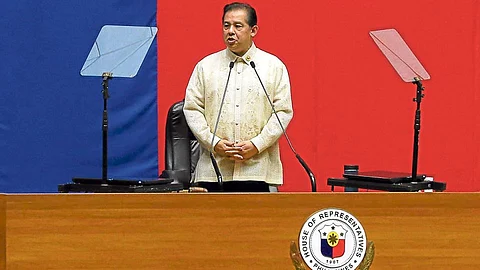
- NEWS
- the EDIT
- COMMENTARY
- BUSINESS
- LIFE
- SHOW
- ACTION
- GLOBAL GOALS
- SNAPS
- DYARYO TIRADA
- MORE

The Office of House Speaker Ferdinand Martin G. Romualdez on Tuesday reiterated its full commitment to transparency and proper institutional processes amid renewed discussions surrounding the distribution of government aid programs and budget amendments.
This comes after Rep. Toby Tiangco raised concerns about the allocation of various social aid programs such as the Assistance to Individuals in Crisis Situations (AICS), Ayuda para sa Kapos ang Kita Program (AKAP), TUPAD, and Medical Assistance to Indigent Patients (MAIP).
Tiangco claimed these were being subjected to unnecessary approval by the House leadership—an assertion strongly denied by the Speaker’s office.
House spokesperson Princess Abante emphasized that these programs are implemented solely by the executive branch through the Departments of Social Welfare and Development, Labor and Employment, and Health, all of which maintain full control over the programs’ execution.
“Toby Tiangco has served in Congress long enough to know that the Speaker does not control the funds of these agencies,” Abante said. “Final decisions rest entirely with the implementing agencies, which evaluate each request based on program guidelines, fund availability, and internal rules.”
She clarified that the Speaker’s office, much like other congressional offices, may endorse constituent requests from local leaders or fellow legislators, but these referrals are strictly non-binding and do not influence approval decisions.
Romualdez’s office reaffirmed that the House remains fully compliant with the Supreme Court’s landmark Belgica v. Executive Secretary ruling, which bars legislators from exercising post-enactment discretion over public funds—a ruling the Speaker has long upheld.
In fact, many of the programs mentioned, such as AKAP, are seen as innovative initiatives under the current House leadership, aimed at expanding assistance to low-income families.
The AKAP program, with a P26-billion allocation in this year’s national budget, was conceptualized by the House under Romualdez to support workers and individuals struggling with inflation and job disruptions.
The proposal initially faced hurdles in the budget process, but was restored through bicameral consensus—a reflection, the Speaker’s allies said, of the House’s firm stance on pro-people legislation and responsive social safety nets.
Budget traditions defended
Addressing separate concerns raised by Tiangco about the use of a small committee to finalize the General Appropriations Bill (GAB), Abante said the practice was a longstanding parliamentary mechanism used across multiple Congresses, including those where Tiangco himself held leadership positions.
“The small committee’s role is to consolidate amendments and ensure legislative efficiency. It does not override plenary powers and is subject to full reporting,” Abante said. “It has never been secret, and calling it such misrepresents the process.”
She noted that the Speaker has been consistent in supporting the President’s budget priorities and maintaining an alignment with the National Expenditure Program (NEP).
President Marcos himself, in his recent State of the Nation Address, emphasized the need for a budget process that is consistent with his administration’s goals.
Overwhelming mandate
Despite the political noise, Romualdez was resoundingly reelected to lead the 20th Congress with 269 votes from the 318-member House.
Lawmakers who backed him cited his steady leadership, consensus-building style, and commitment to fast-tracking legislation in support of economic recovery, agricultural development, and education reforms.
Many in the chamber pointed to Romualdez’s role in navigating critical legislation during the pandemic recovery years and his efforts at building consensus around pro-people programs like AKAP and MAIP.
As the House resumes its work on the 2026 national budget, Romualdez is expected to continue championing efficient, transparent, and inclusive budgeting practices—firmly anchored in the rule of law and the principles of legislative integrity.
